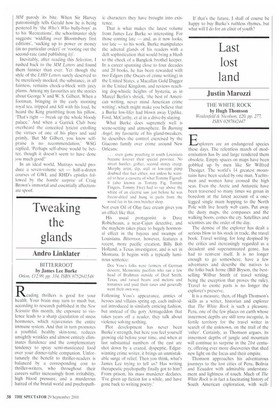Tweaking the glands
Andro Linklater
BITTERROOT by James Lee Burke
Orion. £12.99, pp. 334, ISBN 0752841548
Reading thrillers is good for your health. Your brain may turn to mush but. according to research published in the New Scientist this month, the exposure to violence leads to a sharp ejaculation of stress hormones, which rejuvenates the entire immune system. And that in turn promotes a youthful, healthy skin-tone, reduces unsightly wrinkles and almost entirely eliminates flatulence and the complementary tendency to spray semi-masticated food over your dinner-table companion. Unfortunately the benefit to thriller-readers is balanced by a corresponding cost to thriller-writers, who throughout their careers suffer increasingly from irritability, high blood pressure. and a murderous hatred of the brutal world and psychopath
ic characters they have brought into existence.
That is what makes the latest volume from James Lee Burke so interesting. For those coming late — and, as it now looks, too late — to his work. Burke manipulates the adrenal glands of his readers with a deft sophistication that would bring a blush to the cheek of a Bangkok brothel keeper. In a career spanning close to four decades and 20 books, he has been rewarded with two Edgars (the Oscars of crime writing) in the United States, a Macallan Gold Dagger in the United Kingdom, and reviews reaching dog-whistle heights of hysteria, as in Marcel Berlin's shriek, 'the best of American writing, never mind American crime writing', which might make you believe that a Burke low-lifer had blown away Updike. Ford, McCarthy, et al in a drive-by slaying.
What Burke does supremely well is scene-setting and atmosphere. In Burning Angel, my favourite of his gland-tweakers, he describes the control exercised by the Giacono family over crime around New Orleans:
... even game poaching in south Louisiana became forever their special province. No street hustler, grifter. second storey creep. Murphy artist, dip, stall or low-rent pimp doubted that fact either, not unless he wanted to hear a cassette of what Tommy Figorelli (also known as Tommy Fig, Tommy Fingers. Tommy Five) had to say above the whine of an electric saw just before he was freeze-dried and hung in parts from the wood fan in his own butcher shop.
Not even Oil of Olay face cream gives you an effect like that.
His usual protagonist is Dave Robicheaux, a near-Cajun detective, and the mayhem takes place to hugely hormonal effect in the bayous and swamps of Louisiana. Bitterroot, however, features a recent, more pacific creation, Billy Bob Holland, a Texas investigator, and is set in Montana. It begins with a typically luminous sentence:
Doc Voss's folks were farmers of German descent, Mennonite pacifists who ran a few head of Brahman outside of Deaf Smith. Texas, and raised beans and melons and tomatoes and paid their taxes and generally went their own way.
Following Voss's appearance, armies of heroes and villains spring up, each individual introduced in similarly enticing fashion, but instead of the gory Armageddon that takes years off a reader, they talk about violence solving nothing.
Plot development has never been Burke's strength, but here you feel yourself growing old before your time, and when at last substantial numbers of the cast are shot down by a crazed, dyspeptic, Edgarwinning crime writer, it brings an unmistakable surge of relief. Then you think, what's James Lee trying to tell us? Has writing therapeutic psychopathy finally got to him? From prison, his mass murderer declares, 'I've given up fiction for a while, and have gone back to writing poetry.' If that's the future, I shall of course be happy to buy Burke's ruthless rhymes, but what will I do for an elixir of youth?






































































 Previous page
Previous page